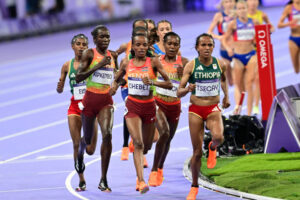The women’s 5,000m final at the Paris Olympics provided a thrilling conclusion, punctuated by a controversial disqualification and a subsequent appeal. Ultimately, Kenya secured a one-two finish, with Beatrice Chebet claiming the gold medal and Faith Kipyegon regaining the silver after a dramatic post-race review.
Chebet, the reigning world champion in the 10,000m, delivered a textbook performance. She bided her time throughout the race, following the leading pack before unleashing a decisive late surge. In the final meters, she displayed her superior finishing speed to cross the line first in a time of 14 minutes and 28.56 seconds.
However, the initial podium celebrations were marred by controversy. The pre-race favorite, Faith Kipyegon, who holds the world championship title in the 5,000m, finished a close second. However, she was disqualified by race officials for an alleged obstruction on Ethiopia’s world record holder, Gudaf Tsegay, with two laps remaining.
The decision sparked immediate debate. Replays showed a slight contact between Kipyegon and Tsegay as they jostled for position. While Tsegay appeared to be momentarily impeded, the contact seemed minimal and without significant impact on her race.
https://x.com/athletics_kenya/status/1820578024208900429?s=46
Team Kenya immediately lodged an appeal, arguing that the disqualification was harsh and did not warrant penalizing Kipyegon. After a tense period of deliberation, the appeal was upheld. Officials deemed the contact incidental and insufficient to warrant a disqualification.
This decision reshuffled the final standings. Chebet retained her gold medal, while Kipyegon’s silver was reinstated. Dutch runner Sifan Hassan, who had initially finished third, was bumped down to the bronze medal position. Italian athlete Nadia Battocletti, who crossed the line fourth initially, was left off the podium altogether.
The reinstatement of Kipyegon’s silver medal ensured a dominant Kenyan presence on the podium, showcasing the nation’s continued strength in distance running.

For Chebet, the victory represents a significant milestone in her career. The 24-year-old has steadily risen through the ranks and finally achieved Olympic glory. Her tactical awareness and strong finishing kick proved decisive in securing the gold medal.
Kipyegon, visibly relieved by the reversal of the disqualification, now holds both silver medals in the Olympic 5,000m, having finished second in Rio 2016 as well. While she may have missed out on gold, the reinstatement of her silver medal is a testament to her determination and resilience.
The incident raises questions about the use of video review and the interpretation of race contact in distance running. While technology can play a role in ensuring fair play, the judgment of officials remains crucial in determining the severity of such situations.
Overall, the women’s 5,000m final provided a dramatic spectacle, showcasing both athletic talent and the ever-present drama of officiating decisions. The final result highlights Kenya’s dominance in the distance running scene, and serves as a testament to the unwavering determination of both Chebet and Kipyegon.






